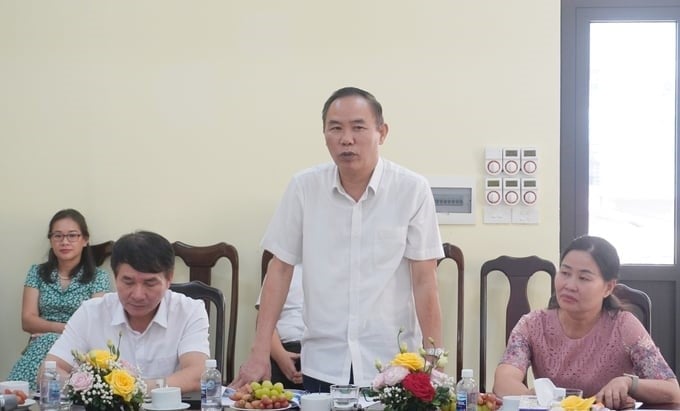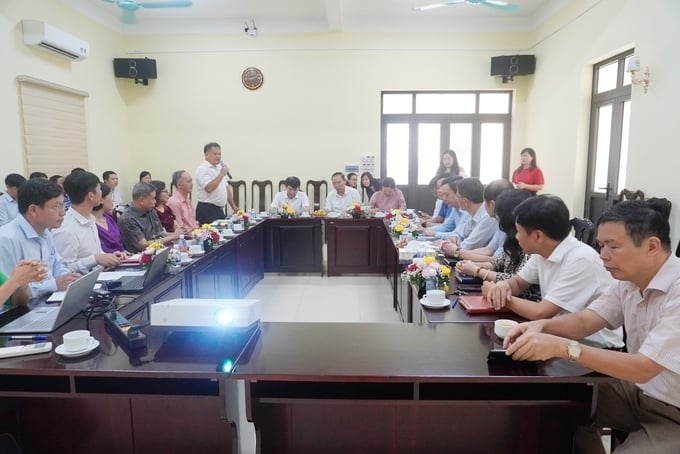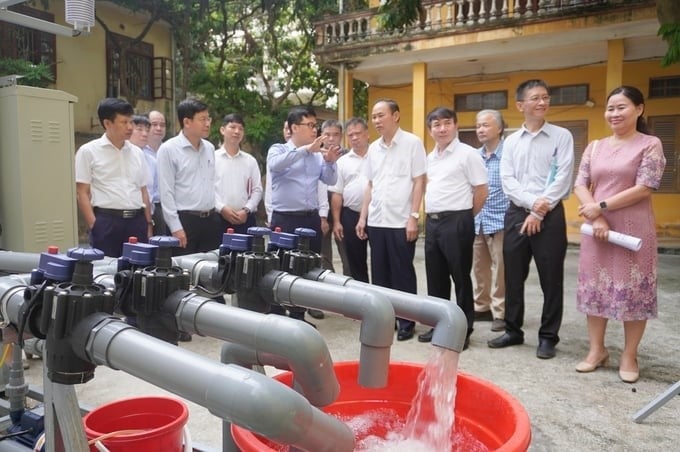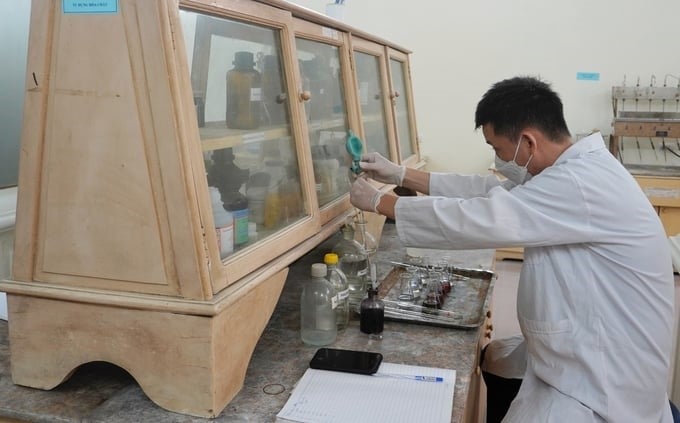May 30, 2025 | 05:18 GMT +7
May 30, 2025 | 05:18 GMT +7
Hotline: 0913.378.918
May 30, 2025 | 05:18 GMT +7
Hotline: 0913.378.918
Recently, Deputy Minister of Agriculture and Rural Development Phung Duc Tien visited and worked with the Institute of Water and Environment (IWE) under the Vietnam Academy for Water Resources (VAWR).

Deputy Minister of Agriculture and Rural Development Phung Duc Tien affirmed that IWE’s role is very important. Photo: Hong Tham.
Mr. Le Xuan Quang, Deputy Director of IWE, introduced the Institute’s functions and tasks and reported briefly the results of scientific and technological activities and development orientation by 2023.
Mr. Quang said IWE has the function of scientific research to serve public services, technology transfer, training, international cooperation, investment consulting, and construction of projects in the fields of water resources, irrigation, land reclamation, water supply and drainage, environment, climate change adaptation, and conservation and restoration of ecosystems nationwide. The Institute also undertakes the functions of the Thematic Institute and the Northern Regional Institute.

Mr. Nguyen Tiep Tan, Deputy Director of VAWR and Director of IWE, shared some of the Institute's current difficulties. Photo: Hong Tham.
According to Mr. Quang, in recent times, IWE has achieved many important scientific results, such as building a smart irrigation weather station to modernize the management and operation of small and medium irrigation structure systems in the context of climate change; forecasting and warning about water resources, water source security, saltwater intrusion, and drought to serve irrigation systems. Developing a set of irrigation and fertilization procedures for some key crops; researching and proposing technological solutions for collecting and treating wastewater and sludge in urban areas, rural areas, craft villages, and suburbs, as well as solutions to reduce wastewater and solid waste pollution; and researching and proposing models of water treatment and storage in rural areas, etc.
"In the coming time, the Institute's goal is to become a strong unit of scientific research and technology transfer in the industry, on par with research institutes in the region," Mr. Quang said.

Representatives of IWE introduced the automatic irrigation and fertilization system. Photo: Hong Tham.
At the working session, IWE’s officials and employees also shared some of the difficulties currently being encountered, such as limited scientific and technological activities and projects; the organization and implementation of work that have gradually become professional and methodical but still need in-depth research groups to solve problems of ministries and branches through scientific and technological tasks; and research support tools, equipment, and facilities that are still backward and do not meet high-demand tasks.
Mr. Nguyen Tiep Tan, Deputy Director of VAWR and Director of IWE, proposed a number of recommendations, such as: creating conditions for the Institute’s young scientists to participate in training courses to improve capacity; Perfecting organizational work; being assigned to perform comprehensive and deeply specialized tasks according to the Institute’s functions and tasks. At the same time, consolidating and building infrastructure and creating conditions for the Institute to participate in scientific and technological activities, programs, and projects of the Ministry of Agriculture and Rural Development and the sector according to the Institute's functions and strengths.
Ms. Nguyen Thi Thanh Thuy, Director of the Science, Technology, and Environment Department (Ministry of Agriculture and Rural Development), assessed that in recent times, IWE has achieved very "steady" results in many fields. Scientific and technological products are generally very good and highly applicable; however, the Institute should not just stop at the process but need to go to the final product for practice to achieve economic efficiency. In the coming time, the Institute needs to exploit its full potential and advantages and expand its tasks, not limit itself.

IWE said that research support tools, equipment, and facilities are still backward and do not meet high-demand tasks. Photo: Hong Tham.
Deputy Minister of Agriculture and Rural Development Phung Duc Tien affirmed: "Without irrigation, there would be no today’s achievements of the agriculture sector. IWE’s role is very important, contributing a lot of effort and intelligence to the development of the agriculture and irrigation sectors. In the context of agriculture changing towards clean, organic, ecological agriculture, circular economy, digital transformation, etc., irrigation has many difficulties and needs to change the approach and pivot."
The Deputy Minister said: "Scientific research is to promote production and get ahead of production. To do this, we must stick to the market and trends. In the face of climate change, scientific topics must focus on that but still remain true to the Institute's functions of water, irrigation, and the environment."
"In the coming time, the Institute of Water and Environment needs to urgently consider organizational issues; at the same time, it is mandatory to increase solidarity and consensus. To do this, it requires openness and transparency. Research contents must inherit, promote, and integrate with the environment. The water security program must go first and be proactive early and from afar. It is necessary to focus on international cooperation and strengthen learning. All must join hands and contribute," Deputy Minister Phung Duc Tien emphasized.
Translated by Huyen Vu Thu

(VAN) Ms. Nguyen Thi Dung, Deputy Director of Ngoc Hoang Cooperative, shared about the journey of bringing dragon fruit to Europe, achieving annual revenues in the billions of VND.

(VAN) Bamboo products from Thang Tho Bamboo Cooperative have reached many countries around the world, while also creating jobs for local workers.

(VAN) The Management Board of Con Dao National Park reported that a green sea turtle, tagged in the Philippines, has traveled thousands of kilometers to lay 84 eggs on Bay Canh Islet.

(VAN) Green technology is paving a new path for sustainable aquaculture in the Mekong Delta in particular and across the country in general, helping reduce emissions and adapt to climate change.

(VAN) On May 27, La French Tech Vietnam (the French startup and innovation community in Vietnam) held the French Tech Summit Vietnam 2025.
/2025/05/27/4731-2-223159_980.jpg)
(VAN) No votive paper, no styrofoam, no plastic bags, no plastic bottles, and no single-use plastic trays are the key rules tourists should keep in mind when visiting Con Dao.

(VAN) In the fight against plastic pollution, Vietnam has been demonstrating a proactive, pioneering, and active role in addressing the greatest environmental challenge today.